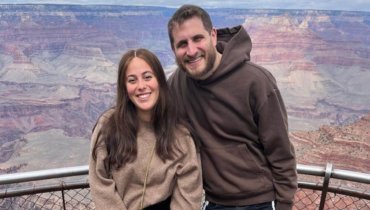
This Orthodox Jewish Mental Health Helpline In Chicago Is Saving Lives
When Dov first discovered his father’s gambling addiction, he was paralyzed. It was bad enough that his otherwise religious parent was breaking Shabbos to get his fix. Dov wasn’t sure what he should do. Should he confront his father? Pretend he didn’t know? What is a child’s role in a situation like this? He felt helpless.
Stuck, Dov reached out to Refuah 311.
Jewish communities around the globe have made incredible leaps in battling mental health stigma among its ranks. Once, conditions like depression and OCD were enough to invalidate a shidduch or keep a kid out of school. Today, more people in the Orthodox community are not only opening conversations about these conditions, but actively creating organizations to support the individuals and families affected. Refuah 311 is one of those organizations, pioneering a new way to support Jews who need mental health resources.
Refuah 311, a branch of the Chicago Center of Torah and Chesed, is known locally for its medical work. But when their department started receiving more calls like Dov’s, it was clear that a dedicated mental health unit was necessary. These were cases that represented a wide range of human experiences, from children struggling at school to couples struggling at home to individuals written off by family and friends for their behaviors. But there were also cases that often required a working knowledge of the Orthodox world and lifestyle. Callers often described challenges that could only be understood within a context of Orthodox Jewish life or at least preferred a therapist who would sensitively address these parts of themselves while assisting them with their problems.
“At first, we focused on networking with community therapists and getting to know the local treatment centers so that if someone called we could refer them to an appropriate professional or program while keeping in mind their insurance limitations,” says Josh Ford, the director of the new program. “But we quickly realized that this method fell short.”
The problem, they found, was that there didn’t seem to be much consensus about what made something “good” when it came to mental health. The same therapist might earn rave reviews from some clients while raising serious red flags with others. Giving a referral was like throwing spaghetti at a wall and hoping it magically healed emotional traumas.
Speaking to Jewish referral groups in other large Jewish communities, Refuah 311 found that at their core, the programs were all doing the same thing, with similarly uneven results.
Shira is a veteran of the mental health system. As a child, a community leader molested her, leading her to adopt a host of self-destructive behaviors. Her parents had sent her to multiple therapists, but progress always stalled after a few sessions. By the time she reached adulthood, she was broke, couldn’t hold down a job, and regularly abused medications. No therapists wanted to take on her case, and most of the community had written Shira off as a lost soul.
COVID-19 brought an influx of calls as lockdowns exacerbated existing challenges and created new ones. So while the medical branch of Refuah 311 rolled up its sleeves to provide community-wide testing (and later vaccination), the mental health side changed the game.
“We started with the question ‘Does therapy actually work?’ and then followed the research from there,” explains Ford. They connected with Dr. Scott Miller, a renowned academic in outcomes research. Refuah 311 collaborated with him and other experts in the field to adapt a Feedback Informed Treatment model tailored to the Chicago community’s needs.
Under the new system, Refuah 311 radically changed their operation. Before, if Dov had called about his father’s addiction, he either would have received information of treatments to share with his father, with an offer for resources for himself. Instead, using the fresh approach, Dov spoke to an intake coordinator to pinpoint what was going on, how it was affecting him, and what could realistically help.
Going through the process, Dov realized that he wasn’t ready to confront his father but was hurting deeply due to the situation and past ones connected to it. His intake coordinator helped him decide what he would want from the therapeutic process and hammer out a plan he could take with him into therapy. They then connected Dov with both a therapist and a group therapy program that matched his goals.
That usually would have been the end of the referral process, except the team at Refuah 311 had decided to no longer send clients off “hoping for the best.” They would make sure people like Dov had a real chance at success.
So they followed up. Dov and his advocate discussed how he felt the sessions had gone and helped him further plan to continue building on success with his therapist. His therapist appreciated the approach; it took the guesswork out of the initial sessions and allowed Dov to make meaningful strides in his well-being in a short amount of time.
“I’d gone to therapy before to talk about other traumatic events in my life, and it just never worked, so I’d kind of written it off,” Dov says. “The difference with Refuah 311’s referral was that I felt like I knew what I was doing when I met with my therapist. I could articulate my goals, and if things seemed to be going away from them, their system of check-ins helped me reassess and get back on track.”
What about Shira? Things were rough at first. Refuah 311 set her up with a therapist whom she called a “CBT thought Nazi.” After each of her early sessions, she was ready to quit. But when she spoke through what was bothering her with her client advocate, she began to see that her therapist was targeting what she needed, even if it was an uncomfortable process.
So she stuck with it. Now, the woman everyone had written off is weaned off her medications, has gotten a job, and entered a stable relationship. “I keep waiting for the [other] shoe to drop,” she laughs. “I would have dropped out for sure, but Refuah 311 made a good case for continuing, and, I can’t believe I’m saying this, I love my therapist! She’s a tzadeikes!”
On average, about 50% of clients drop out of therapy before they get any benefit, with the average person stopping after their third session. Just connecting someone with a therapist and getting them to that first session isn’t a guarantee they’ll get better.
Refuah 311 focuses on developing a therapeutic alliance with callers to bolster and support the relationship patients build with their referrals. In addition, it increases engagement to reduce premature drop-out by teaching clients to advocate for their own needs and respectfully articulate feedback in a way that therapists are likely to respond to positively.
“We jokingly call this process ‘meta-therapy,’” explains Ford, “because it shares many of the relational aspects of therapy. Our follow-up system not only benefits future clients by collecting data necessary to track therapists’ performance, but we can actually help current clients get better results with the same therapists. This radically transforms the process of evaluating performance from feeling like we’re judging professionals to supporting them. Instead of seeing mistakes and errors as reasons to drop a therapist from our database, we see opportunities for growth and learning.”
It’s just the start, but the Refuah 311 team is hopeful. With more cases reliably turning out like Dov and Shira’s, they are confident this is the right direction. Ford says, “Our approach is different, and for many people different can be scary, but we stand by the strength of the results we’ve been getting. We don’t have the luxury of ignoring the problem and not trying to do everything in our power to fix it.”
If you found this content meaningful and want to help further our mission through our Keter, Makom, and Tikun branches, please consider becoming a Change Maker today.







